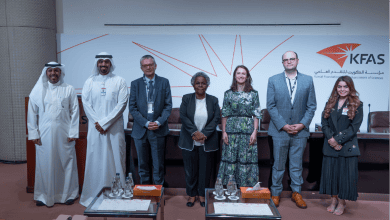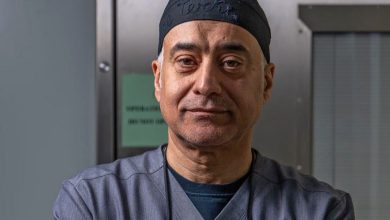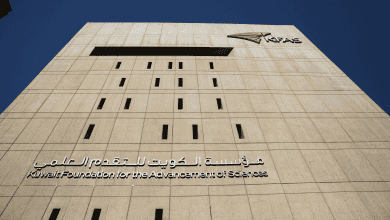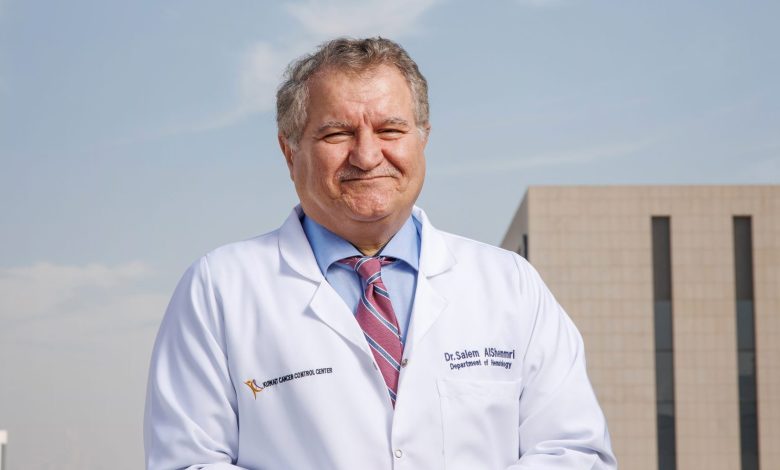
Profile Dr. Salem Hamad Alshemmari
Academic Qualifications:
Bachelor of Medicine and Surgery (B.M.B.CH), Kuwait University, 1987.
Fellowship of the Royal College of Physicians of Canada (FRCPC), Medicine/Hematology –
Western Ontario, Canada, 1994.
Fellowship in Bone Marrow Transplantation – Fred Hutchinson Cancer Research Center, USA,
1994-1995.
Clinical Roles:
Director, Lymphoma Unit, Kuwait Cancer Control Center (KCCC).
Director, Stem Cell Transplantation Unit and Processing Laboratory, KCCC.
Member, National Cancer Control
Committee & Organ Transplant Committee.
Academic Roles:
Clinical Associate Professor, Faculty
of Medicine, Kuwait University
(since 1997).
Hematology Course Coordinator (1998-2005, 2008).
Examiner and lecturer for undergraduate and postgraduate medical education.
Developer of innovative
bedside teaching techniques
and OSCE training.
Administrative Experience:
Assistant Director, Medical Education, Faculty of Medicine, Kuwait University (2002-2004).
Chair/member of various faculty and departmental committees, including examination and budget committees.
Research Contributions:
Principal Investigator on grants addressing hypercoagulable disorders, lymphoma, and HLA gene frequency in Kuwait.
Co-investigator on studies exploring cytogenetic abnormalities and fungal infections in immunocompromised patients.
Courses and Workshops Organized:
Venous Thromboembolism
Update (1999).
Hematology Applied Evidence-Based Medicine Workshop (2004-2005).
Various Continuing Medical
Education (CME) activities on immune system disorders, biostatistics, and molecular biology.
Memberships:
International Bone Marrow Transplant Registry
American Society of Hematology (ASH)
European Bone Marrow Registry
Key Achievements:
Established the Lymphoma and Stem Cell Transplantation Units
at KCCC.
Conducted impactful research
on leukemia, lymphoma and stem cell transplantation.
Enhanced medical education through curriculum development and innovative teaching methodologies.
Research Outcomes
—
Molecular and genomic information
is being used more frequently for:
Diagnosing cancer.
Estimating prognosis.
Selecting targeted treatments that are safe and effective.
Personalized medicine tailors treatment to each patient’s genetic makeup, offering:
Safer and more effective care
The potential to speed up clinical trial enrollment by focusing on patients with specific genetic profiles
New protocol developed by
the research team:
Stratifies patients based on genetic markers and cytogenetic results
Provides a more effective therapeutic approach for treating cancer patients
Importance of the study:
There are no similar studies conducted in Kuwait or nearby countries.
The research fills a knowledge gap between Kuwait and global advancements in cancer treatment.
Focus of the study:
Molecular profiling of chronic lymphocytic leukemia (CLL)
Provides a baseline and future reference for personalized medicine in the region.
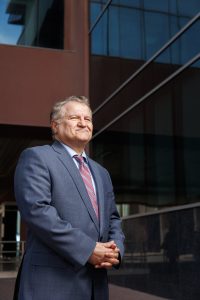
Dr. Salem Alshemmari is a renowned physician and academic specializing in hematology and stem cell transplantation. With over two decades of experience, he has significantly contributed to clinical care, research, and medical education in Kuwait. He is currently a Clinical Associate Professor at Kuwait University’s Faculty of Medicine and Director of the Lymphoma and Stem Cell Transplantation Units at the Kuwait Cancer Control Center (KCCC).
Dr. Alshemmari earned his medical degree from Kuwait University in 1987 and obtained the Fellowship of the Royal College of Physicians of Canada in Medicine and Hematology in 1994. He further specialized in bone marrow transplantation at the Fred Hutchinson Cancer Research Center. At KCCC, he pioneered the establishment of the Lymphoma Unit and a state-of-the-art stem cell processing laboratory, enhancing transplant services in Kuwait.
In academia, Dr. Alshemmari has been a cornerstone of medical education since 1997, teaching undergraduate and postgraduate courses, developing curricula, and mentoring students. His engaging teaching style has earned consistently high evaluations. He also plays a vital role in postgraduate training for residents in general medicine and surgery.
Dr. Alshemmari’s research focuses on lymphoma, stem cell transplantation, and hypercoagulable disorders, with several studies funded by prestigious grants. His ongoing work investigates cytogenetic aberrations in lymphoma and myeloproliferative neoplasms.
Beyond clinical and academic roles, Dr. Alshemmari actively participates in national healthcare initiatives and international collaborations, holding memberships in esteemed organizations such as the International Bone Marrow Transplant Registry and the American Society of Hematology.
Previously, cancer treatment followed a one-size-fits-all approach, particularly with chemotherapy. In the 1980s, chemotherapy was often the only available tool, but at the price of significant toxicity. Today, precision medicine is transforming cancer care by tailoring treatments to the unique biology of each patient. “For instance, in chronic lymphocytic leukemia (CLL) -a slow-growing blood cancer, we can now test for mutations early and avoid chemotherapy for patients unlikely to respond,” says Dr. Salem Alshemmari, a prominent Kuwaiti Hemato-Oncologist and SCT Unit Director at the Kuwait Cancer Control Center (KCCC).
Acute Myeloid Leukemia (AML), a rare and aggressive blood cancer with 40–50 cases annually in Kuwait, as Dr. Alshemmari reports, is the focus of one of his most ambitious projects. Using Next-Generation Sequencing (NGS), his team identifies genetic mutations to classify and predict how the disease behaves. “NGS gives us genetic and molecular characteristics of these cancers, allowing us to analyze multiple genes simultaneously and determine their behavior,” he explains. This approach also emphasizes studying Kuwait’s population, where genetic markers and outcomes may differ significantly from European data.
“If you look at the literature, it’s heavily based on European populations,” he says. This disparity matters because genetic and clinical markers often vary between populations, as demonstrated in his earlier work on chronic lymphocytic leukemia (CLL), a gradually progressing blood cancer that affects white blood cells, weakening the immune system over time. “The median age of CLL diagnosis is 72 in Europe and the U.S., compared to just 59 in Kuwait,” the physician says. This has significant implications. A 72-year-old patient is often nearing the end of their expected lifespan, whereas a 59-year-old may still have many years ahead. Similarly, for AML, his research explores whether specific markers are more prevalent in Kuwait’s population and whether treatment outcomes differ.
In a second project of his, Dr. Alshemmari is targeting myeloproliferative neoplasms (MPNs), a group of rare blood disorders that includes polycythemia vera (PV), essential thrombocythemia (ET), and myelofibrosis (MF). These diseases are challenging to diagnose due to overlapping symptoms with other conditions. “MPNs might not present clear symptoms, and the cells can appear normal,” he explains. This often leads to a dangerous misdiagnosis, with around 20 percent of MPN patients initially presenting with severe thrombosis before being correctly identified, as he says. Advances in biomarkers (such as JAK2, CALR, and MPL mutations) now allow for more accurate diagnoses and targeted treatments. “With biomarkers, we can precisely diagnose and treat the patient—whether that means therapeutic phlebotomy or aspirin to prevent thrombosis,” Dr. Alshemmari illustrates.
As precision medicine continues to transform cancer treatment, the Kuwaiti scientist’s focus extended to the unique challenges posed by the COVID-19 pandemic. One of his projects examined the pandemic’s impact on cancer patients, particularly those with blood malignancies, revealing higher mortality rates in advanced cases. The study also highlighted the shift to telemedicine and oral treatments as strategies to reduce risks.“Telemedicine became more common, and to my surprise, patients appreciated it,” he says, noting how virtual consultations maintained care while minimizing exposure.

At the same time, he criticizes the old-school mentality of “my way or the highway,” stressing that it can erode trust with patients and colleagues. “Nowadays, we have multidisciplinary meetings where we involve everyone—pain specialists, nurses, nutritionists, physiotherapists—to provide holistic care. Patients’ needs extend beyond medical treatment; issues like depression, nutrition, and mobility are just as important.”
Dr. Alshemmari likens the process to running a ship: “The captain needs a crew to look after the engines and other parts. Everyone’s contribution matters.”
Perhaps it is the dual identity as an academic and a doctor -out there in the trenches- that helps him keep his feet on the ground. “I always tell my students to distinguish themselves not just by treating patients but also by conducting research. Research allows us to understand diseases better and apply findings directly to patient care,” he says. This concept of translational medicine-taking insights from the lab and applying them to patients, and vice versa - is incredibly important to him. At the same time, he advises doctors to never forget how beautiful life outside work is.
“Sometimes we don’t realize the stress we’re under, but it’s there,” Dr. Alshemmari says. “I’ve seen physicians experience burnout, especially when they become too attached to their patients. It’s hard to see a patient deteriorate. Physicians need to be aware of this and take breaks. Spend time with family, travel, or pursue hobbies—these things are crucial.”
He believes he has struck the right balance in his own life. “I have a daughter and a wife, and we like to travel in the summer. I try to participate in my daughter’s activities, like her swimming lessons at school.” When asked if his daughter aspires to follow in his footsteps, he smiles. “She says she does, but she’s only 11 years old, so it’s still early. I’m not sure if she says it just to make me happy!”
Dr. Alshemmarihas himself authored a book titled “Basis of Malignant Hematology Practice in Kuwait: Emphasis on Local Data.” The book provides a comprehensive look at hematologic malignancies with a specific focus on the unique epidemiological, genetic, and therapeutic characteristics of the Kuwaiti population. By combining local data with global advancements, this book aims to bridge gaps in medical literature and serve as a go-to resource for both professionals and students in the field. He is also planning another book, this time focusing on AML.
Looking ahead, Dr. Alshemmari envisions a future where precision medicine reshapes the healthcare landscape even more radically. “Over the next 10 years, I expect more advancements. As we discover more markers, we’ll be able to diagnose, prognose, and treat with even greater specificity,” he says. And with more drugs entering the market, doctors will be able to match treatments to patients based on unique molecular markers and genetic backgrounds, rather than applying blanket strategies failing to account to individual differences. “This will revolutionize medicine,” Dr. Alshemmari enthusiastically says. In a sense, patient care is going to look like a ship with a captain and crew—and engines with unique blueprints and their own distinct manuals.


